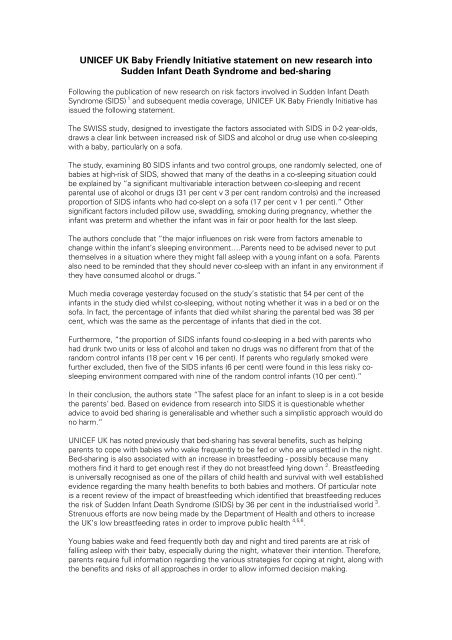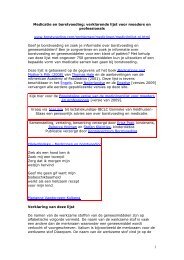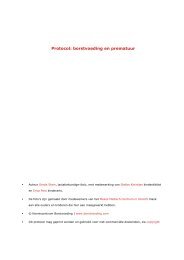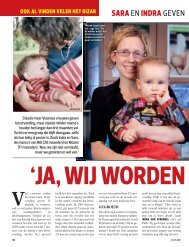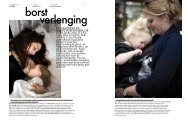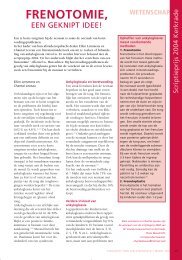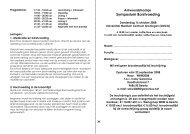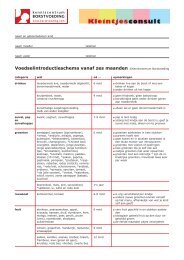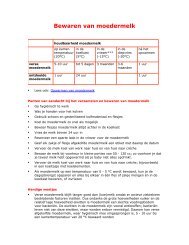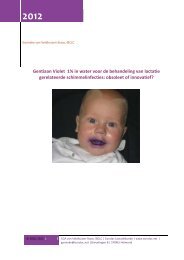UNICEF UK Baby Friendly Initiative statement ... - Borstvoeding.com
UNICEF UK Baby Friendly Initiative statement ... - Borstvoeding.com
UNICEF UK Baby Friendly Initiative statement ... - Borstvoeding.com
You also want an ePaper? Increase the reach of your titles
YUMPU automatically turns print PDFs into web optimized ePapers that Google loves.
<strong>UNICEF</strong> <strong>UK</strong> <strong>Baby</strong> <strong>Friendly</strong> <strong>Initiative</strong> <strong>statement</strong> on new research intoSudden Infant Death Syndrome and bed-sharingFollowing the publication of new research on risk factors involved in Sudden Infant DeathSyndrome (SIDS) 1 and subsequent media coverage, <strong>UNICEF</strong> <strong>UK</strong> <strong>Baby</strong> <strong>Friendly</strong> <strong>Initiative</strong> hasissued the following <strong>statement</strong>.The SWISS study, designed to investigate the factors associated with SIDS in 0-2 year-olds,draws a clear link between increased risk of SIDS and alcohol or drug use when co-sleepingwith a baby, particularly on a sofa.The study, examining 80 SIDS infants and two control groups, one randomly selected, one ofbabies at high-risk of SIDS, showed that many of the deaths in a co-sleeping situation couldbe explained by “a significant multivariable interaction between co-sleeping and recentparental use of alcohol or drugs (31 per cent v 3 per cent random controls) and the increasedproportion of SIDS infants who had co-slept on a sofa (17 per cent v 1 per cent).” Othersignificant factors included pillow use, swaddling, smoking during pregnancy, whether theinfant was preterm and whether the infant was in fair or poor health for the last sleep.The authors conclude that “the major influences on risk were from factors amenable tochange within the infant’s sleeping environment….Parents need to be advised never to putthemselves in a situation where they might fall asleep with a young infant on a sofa. Parentsalso need to be reminded that they should never co-sleep with an infant in any environment ifthey have consumed alcohol or drugs.”Much media coverage yesterday focused on the study’s statistic that 54 per cent of theinfants in the study died whilst co-sleeping, without noting whether it was in a bed or on thesofa. In fact, the percentage of infants that died whilst sharing the parental bed was 38 percent, which was the same as the percentage of infants that died in the cot.Furthermore, “the proportion of SIDS infants found co-sleeping in a bed with parents whohad drunk two units or less of alcohol and taken no drugs was no different from that of therandom control infants (18 per cent v 16 per cent). If parents who regularly smoked werefurther excluded, then five of the SIDS infants (6 per cent) were found in this less risky cosleepingenvironment <strong>com</strong>pared with nine of the random control infants (10 per cent).”In their conclusion, the authors state “The safest place for an infant to sleep is in a cot besidethe parents’ bed. Based on evidence from research into SIDS it is questionable whetheradvice to avoid bed sharing is generalisable and whether such a simplistic approach would dono harm.”<strong>UNICEF</strong> <strong>UK</strong> has noted previously that bed-sharing has several benefits, such as helpingparents to cope with babies who wake frequently to be fed or who are unsettled in the night.Bed-sharing is also associated with an increase in breastfeeding - possibly because manymothers find it hard to get enough rest if they do not breastfeed lying down 2 . Breastfeedingis universally recognised as one of the pillars of child health and survival with well establishedevidence regarding the many health benefits to both babies and mothers. Of particular noteis a recent review of the impact of breastfeeding which identified that breastfeeding reducesthe risk of Sudden Infant Death Syndrome (SIDS) by 36 per cent in the industrialised world 3 .Strenuous efforts are now being made by the Department of Health and others to increasethe <strong>UK</strong>’s low breastfeeding rates in order to improve public health 4,5,6 .Young babies wake and feed frequently both day and night and tired parents are at risk offalling asleep with their baby, especially during the night, whatever their intention. Therefore,parents require full information regarding the various strategies for coping at night, along withthe benefits and risks of all approaches in order to allow informed decision making.
In an interview with <strong>UNICEF</strong> <strong>UK</strong>, Dr Peter Blair, a co-author of the SWISS study, said “Weneed to remind parents that there are certain situations where you never share a bed andbalance that with sharing a bed at other times…It might be that if you demonise the parentalbed you’re still going to get tired mothers with young infants where the infant has woken upthree or four times in the night and needs feeding and the mother’s walking around thinkingthey can’t take them into the bed, so they go onto the sofa and there they fall asleep. Thatwill and does happen. So <strong>com</strong>ing out with a simplistic <strong>statement</strong> about bedsharing can domore harm than good.”In recognition of this, the <strong>UNICEF</strong> <strong>UK</strong> <strong>Baby</strong> <strong>Friendly</strong> <strong>Initiative</strong> has for some time beenworking to assist health professionals to discuss bed-sharing with parents so that risks canbe identified and minimised, rather than attempting to promote restrictions which cannot beapplied in parents’ real worlds.A sample bed-sharing policy has been developed for hospitals and a leaflet for parentsproduced with the Foundation for the Study of Infant Deaths (FSID). Both are designed topromote safety whilst protecting breastfeeding, by educating health professionals andparents on the benefits, contra-indications and safety issues surrounding this practice.<strong>UNICEF</strong> has also been urging NHS trusts to acknowledge the gap in health professional’sknowledge and provide training on all aspects of bed-sharing, including best practice forhospitals and how to <strong>com</strong>municate the key messages effectively to parents depending ontheir needs and circumstances.Footnotes1. Blair PS, Sidebotham P, Evason-Coombe C, Edmonds M, Heckstall-Smith EMA, Fleming P (2009). Hazardouscosleeping environments and risk factors amenable to change: case-control study of SIDS in south west England.BMJ 2009;339:b36662. Blair PS and Ball HL (2004). The prevalence and characteristics associated with parent-infant bed-sharing inEngland. Arch Dis Child 89:1106-11103. Ip S. et al (2007) Breastfeeding and Maternal Health Out<strong>com</strong>es in Developed Countries. AHRQ Publication. No.07-E007.4. HM Government (2008) PSA Delivery Agreement 12: Improve the health and wellbeing of children and youngpeople.5. Department of Health (2008) Healthy Weight, Healthy Lives A Cross Government Strategy for England. London:The Stationery Office.6. Department of Health (2008) Health Inequalities: Progress and Next Steps. London: The Stationary Office


